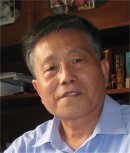Plenary
Lecture
A New Research Direction of Chaos Control:
Multi-Objective Control and its Application

Professor Jin-Qing Fang
China Institute of Atomic Energy
P.O. Box 275-81, Beijing 102413
P R China
E-mail: fjq96@126.com
Abstract: The conventional chaos control is only to reach single control
objective at each time. Different control objective only can be realized at
another time. Obviously, that is not enough for applications of chaos control,
especially for chaotic connected complex network . Therefore a new research
direction of control chaos ― multi-objective control (MOC) is naturally raised
and needed in practical applications, such as in communication engineering,
biological systems, social networks and so on since these systems have more
than one unstable equilibrium and infinite unstable periods or time-space
patterns . In this speech, we not only introduce some effective control
method, but also propose a global linear coupling and combined with local
feedback method to realize multi-objective control method for any chaotic
connected complex network. To demonstrate the method effectiveness and its
potential applications, I will take two typical examples: beam transport
network (BTN) with halo-chaos and Lorenz chaotic connected network.
Brief Biography of the Speaker:
Prof. Jinqing Fang studied and graduated from Department of Physics in
Qing-Hua University (1958-1964), Beijing, P.R.China. Since then he has worked
in China Institute of Atomic Energy, where he has been a research professor of
physics in the 1980's. Since then he became a visiting professor at more than
20 the universities ( Australia National University, The University of Texas
at Austin, The University of Houston, The University of Brussele Libre,
International Center of Theoretical Physics in Italy, The University of
Western Ontario, The University of Alberta, The University of Toronto, The
University of Ottawa , The University of Lethbridge, The University of Arizona
,The University of Sydney ,The City University of Hong Kong, The University of
Poly-technology of Hong Kong, The Chinese University of Hong Kong, and so
on.).
Prof. Fang's main research pursuit has been in the focusing areas in nonlinear
science, chaos control and synchronization as well as networks science with
applications.